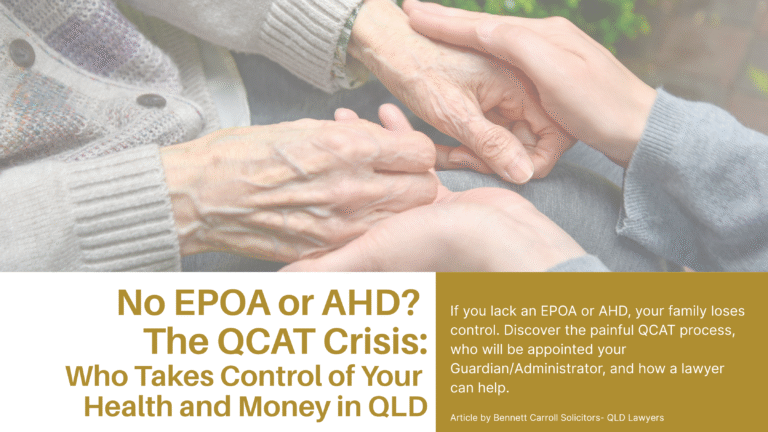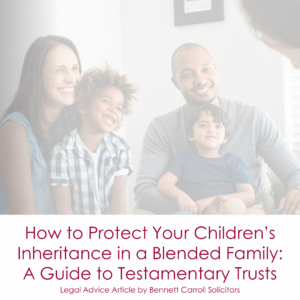Estate planning is about much more than just a Will. While a Will deals with your assets after you die, the most difficult and painful challenges often arise while you are still alive but can no longer make decisions for yourself.
In Queensland, having a valid Enduring Power of Attorney (EPOA) and an Advance Health Directive (AHD) is the only way to ensure you choose who will look after your health, care, and finances if you lose capacity due to injury, illness, dementia, or old age.
But what happens when these crucial documents are missing, and it’s suddenly “too late” to create them?
❌ The Problem: Loss of Capacity Without Documentation
Once a person loses the legal capacity to understand the nature and effect of an EPOA, it is too late for them to sign one. This shifts control from the individual and their chosen family members to a formal, public tribunal process.
When you lose capacity without a valid EPOA, your family—no matter how loving or close—has no automatic legal right to make decisions for you regarding your finances or long-term care.
Scenario A: The Incapacitated Person (Single or Widowed)
- The Situation: A single, divorced, or widowed adult loses capacity due to a sudden illness, accident, or progressing dementia. No EPOA exists.
- The Crisis: Your adult children (whether one or multiple) cannot legally access your bank accounts, manage investments, sell your house, or consent to major, non-emergency surgery. They are legally paralysed from acting in your best interests.
- The Only Legal Solution: The family must apply to the Queensland Civil and Administrative Tribunal (QCAT) for the formal appointment of a Guardian (for personal/health matters) and an Administrator (for financial matters).
Scenario B: The Incapacitated Couple
- The Situation: A husband loses capacity, and his wife holds no EPOA for him. Later, the wife also loses capacity (e.g., a car accident, sudden stroke, or dementia). They have multiple adult children.
- The Crisis: No one can legally manage the couple’s shared finances or make health decisions for either parent. This situation is ripe for sibling conflict, as each child may disagree on the best care options or financial decisions.
- The Only Legal Solution: Separate applications must be made to QCAT for the appointment of a Guardian and Administrator for both QCAT may appoint:
- One child as the sole decision-maker.
- Multiple children to act jointly (often leading to gridlock if they can’t agree).
- The Public Trustee or Public Guardian if the children are deemed unsuitable or cannot resolve their disputes.
When It’s Too Late: The QCAT Intervention
If the person has lost capacity and cannot sign an EPOA or AHD, the only legal path forward is an application to the Queensland Civil and Administrative Tribunal (QCAT).
What is QCAT?
QCAT is an independent statutory body that among other things, holds hearings to determine if an adult has impaired capacity and who should be appointed as their formal decision-maker.
- QCAT Appoints a Guardian: To make personal and health decisions (e.g., where the person will live, what support services they will receive, consenting to medical treatment).
- QCAT Appoints an Administrator: To make financial decisions (e.g., paying bills, managing bank accounts, selling property, and managing investments).
The Painful Reality of a QCAT Application
- High Cost and Time: The application process is lengthy, often taking months, and requires gathering specific medical evidence. It is a costly process that requires significant time and energy from the caring family members.
- Loss of Control: The incapacitated person loses the ability to choose their decision-makers. A third-party tribunal decides who is most appropriate, which may not be the family member the person would have chosen.
- Conflict: QCAT applications often become a battleground for siblings who disagree, leading to fractured family relationships and extended legal disputes.
- Public Scrutiny: Unlike private documents like an EPOA, the QCAT process is a public tribunal hearing that exposes the person’s private circumstances, including their medical and financial affairs.
✅ The Solution: Estate Planning is More Than a Will
The critical takeaway is that estate planning is much more than a Will, and often the hardship is most acute while the person is still alive.
You must secure your future decision-makers while you still have capacity.
The Contrast: Crisis vs. Control
The difference between planning now and facing a crisis later is stark. It’s the difference between Control (your choice) and Crisis (the Tribunal’s choice).
Without an EPOA (The Crisis) ❌
- Crisis: Family is legally unable to act when you lose capacity.
- Process: Costly, lengthy, and public application to QCAT.
- Risk: Family conflict and gridlock over financial and care decisions.
- Decision-Maker: Appointed by a Tribunal (potentially a Public Official).
With an EPOA and AHD (The Control) ✅
- Control: You choose who acts for you (your Attorney). (For more on the basics, read: Understanding Estate Planning Essentials: Key Components for Securing Your Future).
- Process: Private, efficient use of a pre-signed, legally valid document.
- Clarity: Your clear wishes prevent confusion and reduce family friction. (See: Advance Health Directives in Queensland: Protect Your Healthcare Decisions Through Estate Planning).
- Decision-Maker: Appointed by you (e.g., your spouse, child, or trusted friend).
✅ Take Control: Plan Now (Before It’s Too Late)
The time to plan for incapacity is now, while you still have the capacity to choose. Don’t leave your family with a painful and expensive crisis.
This is the essential next step that pairs with your Will to form a complete estate plan.
Secure Your Future – Phone our lawyers now 1300 334 566
- Book a Consultation: Secure your Enduring Power of Attorney and Advance Health Directive. Head to our [Contact Us Page Here].
- Call Us Now: 1300 334 566
(Read more on this crucial combination: Why You Need a Will and Enduring Power of Attorney (EPOA) Together: The Complete Estate Planning Solution).
❌ Already in a Crisis? Get Urgent Advice
If you are reading this and your loved one has already lost capacity without an EPOA, there is still urgent legal help available. While a lawyer cannot help them sign documents, they are essential for navigating the complex QCAT process:
- QCAT Application: A lawyer can efficiently prepare and lodge the application for the appointment of a Guardian and/or Administrator, ensuring all legal and medical requirements are met.
- Representation: If family members agree, a lawyer can represent the applicant at the QCAT hearing, presenting the strongest case for the most suitable appointment.
Urgent Help for QCAT Crisis
If a loved one has lost capacity, our team can guide you through the QCAT application process.
Email us here at info@bcglaw.com.au








